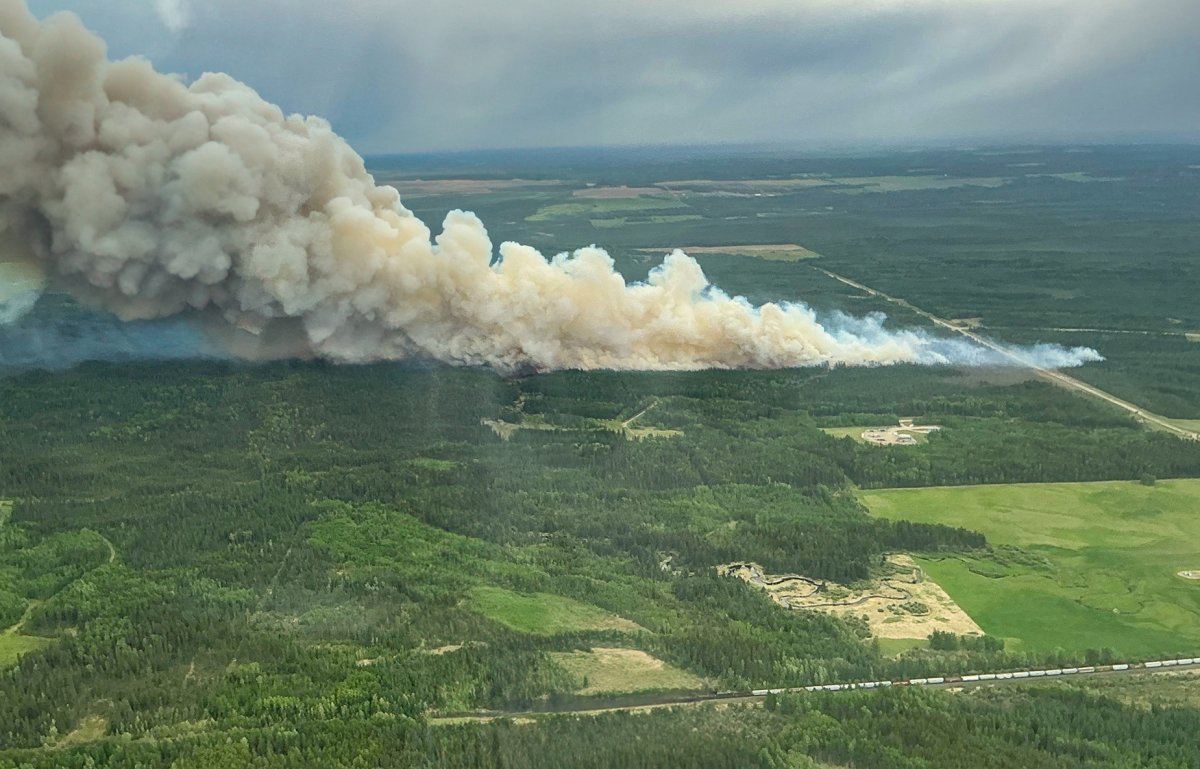Despite a cold front that rolled across much of Alberta on Thursday evening, firefighters continue to face some challenging conditions as they struggle to battle the many wildfires that are ravaging the province.
Alberta Wildfire Information Officer, Derek Forsythe, said the return of sunny weather and strong wind gusts for Friday in some areas created the possibility of “crossover conditions.’”
That means surface temperatures are higher than the relative humidity, causing fire fuels to dry out more quickly and burn at a more rapid rate.
“We are seeing some cooler temperatures, which is helpful to us, but we are still seeing temperatures in the the 20 to 25 degree range and humidity is 15 to 25 per cent,” ,” said Alberta Wildfire Information Officer, Derek Forsythe.
“We did see significant growth (over the last 24 hours), which means the bigger a fire gets, the longer it’s gonna take for us to get around the outer edge, so that has made our job more difficult,” added Forsythe.
The wind gusts are also restricting the use of firefighting aircraft in some areas.
The community of Several more Alberta communities were ordered evacuated overnight, including Chateh, located about 90 kilometres north of High Level is one of the latest communities to be evacuated because of the threat of a wildfire burning near the community.
Alberta Wildfire
Several more Alberta communities were ordered evacuated overnight, including Chateh, located about 90 km north of High Level, and the hamlet of Peers, located about two hours west of Edmonton.
There’s also a mandatory evacuation order in place for Hubert Lake Wildland Provincial Park, located about two hours north of Edmonton.
A fire burning in B.C., close to the Alberta border, has also prompted an evacuation alert to be put in place for the county of Grande Prairie — which means residents there need to be ready to leave within 30 minutes ,if needed.
Many of those forced to flee headed south to Edmonton.
Trevor Ledendre said he and his family got the order to evacuate their community of Loon Lake on Wednesday. They’re now waiting in Edmonton, hoping for firefightes to get the upper hand on the fires so they can return home.
Global News
Trevor Ledendre, an evacuee from Loon Lake, said the order to leave came quickly and they only had a few hours to pack their belongings.
“I kind of noticed something was up. It was getting real smoky before all the alarms went off, before the evacuation even happened,” said Ledendre.
“It was getting real smoky on our reserve.”
Ledendre said he and his family are just hanging out for now — trying to enjoy their time in Edmonton — while they wait for the word they can return home.
The community of Chipewyan Lake, located about 130 kilometres north of Fort McMurray, is threatened by a group of fires known as the Red Earth wildfire complex and Alberta’s Minister of Forestry and Parks, Todd Loewen, said there are indications some structures have been lost.
Alberta Wildfire
In Chipewyan Lake, located about 130 km north of Fort McMurray, and threatened by a group of fires called the Red Earth wildfire complex, there are indications some structures have been destroyed.
However, Alberta’s Minister of Forestry and Parks, Todd Loewen, said the extent of the damage is unknown.
The fires also creating a scary situation for one group of eight firefighters when communication with them was temporarily lost late Thursday.
In a post on social media, the Loewen said the firefighters managed to take shelter in the fire station and school.
On Friday morning, the Municipal District of Opportunity confirmed the firefighters were able to safely drive out of the community after another 20-person crew of firefighters was sent to assist them with clearing fallen trees from the road.
With the possibility of some showers in the forecast on Sunday, firefighters are hoping for some help from mother nature.
But with 51 wildfires currently burning in Alberta and 30 of them still out of control, Forsythe said the provincial government also looking for assistance from other jurisdictions, although with the other western Canadian provinces battling wildfires of their own, he said they’ll need to look further afield for help.




